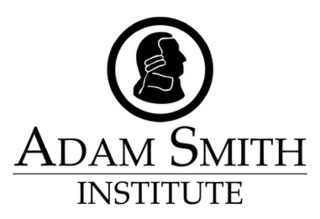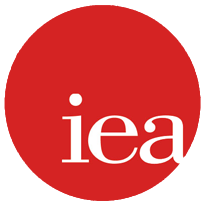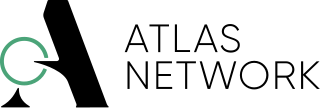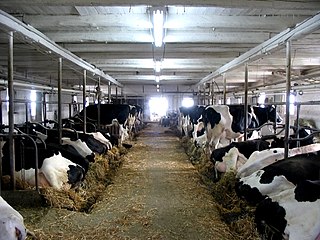
A think tank, or policy institute, is a research institute that performs research and advocacy concerning topics such as social policy, political strategy, economics, military, technology, and culture. Most think tanks are non-governmental organizations, but some are semi-autonomous agencies within government or are associated with particular political parties, businesses or the military. Think-tanks are often funded by individual donations, with many also accepting government grants.
Neoliberalism, also neo-liberalism, is a term used to signify the late-20th century political reappearance of 19th-century ideas associated with free-market capitalism after it fell into decline following the Second World War. A prominent factor in the rise of conservative and right-libertarian organizations, political parties, and think tanks, and predominantly advocated by them, it is generally associated with policies of economic liberalization, including privatization, deregulation, globalization, free trade, monetarism, austerity, and reductions in government spending in order to increase the role of the private sector in the economy and society. The neoliberal project is also focused on designing institutions and has a political dimension. The defining features of neoliberalism in both thought and practice have been the subject of substantial scholarly debate.

The Institute for Public Policy Research (IPPR) is a progressive think tank based in London. It was founded in 1988 by Lord Hollick and Lord Eatwell, and is an independent registered charity. The think tank aims to maintain the momentum of progressive thought in the United Kingdom through well-researched and clearly argued policy analysis, reports, and publications; as well as a high media profile.

The Adam Smith Institute (ASI) is a neoliberal UK-based think tank and lobbying group, named after Adam Smith, a Scottish moral philosopher and classical economist. The ASI is rated as one of the least transparent think tanks in the United Kingdom in relation to funding and has been shown to receive funding from the tobacco industry.

The Institute of Economic Affairs (IEA) is a right-wing pressure group and think tank registered as a UK charity. Associated with the New Right, the IEA describes itself as an "educational research institute", and says that it seeks to "further the dissemination of free-market thinking". It says it does so by "analysing and expounding the role of markets in solving economic and social problems."

The Fraser Institute is a libertarian-conservative Canadian public policy think tank and registered charity. The institute describes itself as independent and non-partisan. It is headquartered in Vancouver, with additional offices in Calgary, Toronto, and Montreal. The institute has ties to a global network of think tanks in 87 countries, including 80 through the Economic Freedom Network. According to the January 2020 Global Go To Think Tank Index Report, Fraser is number 14 in the "Top Think Tanks Worldwide" and number 1 in the "Top Think Tanks in Mexico and Canada".
The Mont Pelerin Society (MPS) is a neoliberal international organization composed of economists, philosophers, historians, intellectuals and business leaders. The society advocates freedom of expression, free market economic policies and the political values of an open society. Further, the society seeks to discover ways in which the private sector can replace many functions currently provided by government entities.
Globalism refers to various patterns of meaning beyond the merely international. It is used by political scientists, such as Joseph Nye, to describe "attempts to understand all the interconnections of the modern world—and to highlight patterns that underlie them." While primarily associated with world-systems, it can be used to describe other global trends. The concept of globalism is also classically used to distinguish the ideologies of globalization from the processes of globalization. In this sense, globalism is to globalization what nationalism is to nationality.

The Foundation for Economic Education (FEE) is an American conservative, libertarian economic think tank. Founded in 1946 in New York City, FEE is now headquartered in Atlanta, Georgia. It is a member of the State Policy Network.

Atlas Network, formerly known as the Atlas Economic Research Foundation, is a non-governmental 501(c)(3) organization based in the United States that provides training, networking and grants for libertarian, free-market, and conservative groups around the world.
The Mercatus Center is an American libertarian, free-market-oriented non-profit think tank located at George Mason University. It is directed by Daniel M. Rothschild and its board is chaired by American economist Tyler Cowen. The Center works with policy experts, lobbyists, and government officials to connect academic learning with real-world practice. Taking its name from the Latin word for market, the center advocates free-market approaches to public policy. During the George W. Bush administration's campaign to reduce government regulation, The Wall Street Journal reported, "14 of the 23 rules the White House chose for its 'hit list' to eliminate or modify were Mercatus entries".

The Montreal Economic Institute (MEI) is a non-profit research organization based in Montreal, Quebec, Canada. It aims at promoting economic liberalism through economic education of the general public and what it regards as efficient public policies in Quebec and Canada through studies and conferences. Its research areas include different topics such as health care, education, taxation, labour, agriculture and the environment. Its studies are often mentioned in the media.

Floyd Arthur "Baldy" Harper was an American academic, economist and writer who was best known for founding the Institute for Humane Studies in 1961.
Capitalist propaganda is promotion of capitalism, often via mass media, education, or other institutions, primarily by the ruling private and political elite. Capitalist propaganda is commonly deployed in capitalist countries to maintain the cultural hegemony of capitalism, by positioning it as the supreme and only valid system, eliminating opposing and dissenting views, and portraying non-capitalist perspectives and countries as comparatively incompetent and inferior, thus reinforcing capitalism as the dominant ideology. Capitalist propaganda may have lasting psychological effects that remain in a population even if the official government of the people is no longer capitalist, which can produce political instability and rebellion. The term capitalist propaganda has been used since at least the early 20th century to describe how propaganda is used by the capitalist class to indoctrinate workers to act against their own interests.
The Canada West Foundation is a non-partisan think tank based in Calgary, Alberta. It primarily conducts research on issues of concern in British Columbia, Alberta, Saskatchewan and Manitoba, but also on issues of national significance.
Thomas Earl Borcherding was an American economist. His areas of specialization include microeconomics, public choice, property rights, exchange and transaction costs, politics and public choice, sociological economics, and the role of institutions in economic, political, and social choice.

Canada's supply management, abbreviated SM, is a national agricultural policy framework used across the country, which controls the supply of dairy, poultry and eggs through production and import controls and pricing mechanisms. The supply management system was authorized by the 1972 Farm Products Agencies Act, which established the two national agencies that oversee the system. The Agriculture and Agri-Food Canada federal department is responsible for both the Canadian Dairy Commission and its analogue for eggs, chicken and turkey products, the Farm Products Council of Canada. Five national supply management organizations, the SM-5 Organizations — Egg Farmers of Canada (EFC), Turkey Farmers of Canada (TFC), Chicken Farmers of Canada (CFC), the Canadian Hatching Egg Producers (CHEP) and the Ottawa-based Canadian Dairy Commission (CDC), a Crown corporation — in collaboration with provincial and national governing agencies, organizations and committees, administer the supply management system.

Masters of the Universe: Hayek, Friedman, and the Birth of Neoliberal Politics is a 2012 book by barrister Daniel Stedman Jones, in which the author traces the intellectual development and political rise of neoliberalism in the United States and the United Kingdom. Originally a PhD thesis, the author adapted it into a book.

The Canada Strong and Free Network based in Calgary, Alberta, is a not-for-profit political advocacy group that was established in 2005 by Preston Manning to promote conservative principles. It was known for the annual "high-profile" Manning Networking Conference (MNC). The Manning Centre operates the for-profit think tank the Manning Foundation, which undertakes some research and analysis, while the Manning Centre self-describes as a "do-tank", that focuses on advocacy, training and networking events for conservatives.
Emma Gilchrist is the Canadian co-founder and editor-in-chief of The Narwhal.












